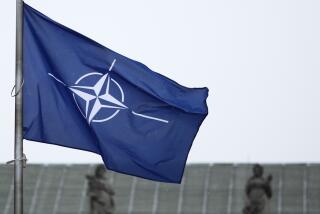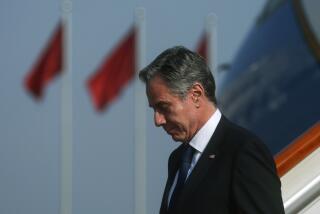Clinton Told to Lobby More for Foreign Policy
- Share via
WASHINGTON — In a biting indictment of President Clinton’s dealings with Congress on important international issues, Sen. Richard G. Lugar (R-Ind.) on Thursday accused him and his administration of a near-total failure to push key foreign policy initiatives.
Lugar predicted that without a major improvement in lobbying efforts, Senate ratification of Clinton’s premier foreign policy initiative--enlargement of NATO--would be in serious danger.
The lone exception to this broader failure, he said, was an effective press by the administration to win recent Senate approval of a global treaty banning chemical weapons.
“Aside from the last push on the [chemical weapons ban], the Clinton administration has been totally ineffective in terms of lobbying on foreign policy issues,” Lugar charged during a breakfast meeting at The Times’ Washington Bureau. “And if we had the same sort of effort with regard to NATO [enlargement] that we’ve had with regard to other situations, we’ll be in bad trouble.”
Lugar, an unsuccessful candidate for the 1996 GOP presidential nomination, accused Clinton of bungling a chance to bring Senate Majority Leader Trent Lott (R-Miss.) with him on his trip to Europe next week as a sign of the bipartisan nature of the U.S. commitment to European security. Instead of asking Lott directly, Lugar said, he was told Clinton merely mentioned to Lott that he’d like to have a Republican along and asked if there might be a volunteer.
“That’s demeaning the whole process,” Lugar said. “[Clinton] should have said: ‘Mr. Leader, will you be there with me?’ But he didn’t. The casualness and the lack of ability, the savvy, in all this is indescribable.”
The criticism is significant because Lugar is both one of the most respected congressional voices on foreign policy matters and an influential supporter of much of the administration’s foreign policy agenda, including enlargement of the North Atlantic Treaty Organization.
He has consistently pressed for an early debate in Congress on important--but so far little noted--aspects of enlargement, such as the new defense commitments it would mean for the United States and the potential difficulties it could bring to nuclear arms control talks with Russia.
Thursday, he urged that these issues be debated before Clinton meets with other alliance leaders in Madrid in July to extend the first formal invitations to prospective NATO members. Hungary, Poland and the Czech Republic are considered the likeliest candidates.
Responding to Lugar’s remarks, a State Department official noted that Clinton had appointed a special assistant whose sole task was to work for Senate ratification of NATO enlargement.
More to Read
Get the L.A. Times Politics newsletter
Deeply reported insights into legislation, politics and policy from Sacramento, Washington and beyond. In your inbox twice per week.
You may occasionally receive promotional content from the Los Angeles Times.










